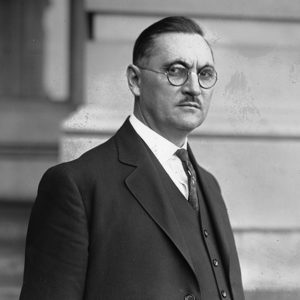calsfoundation@cals.org
Samuel Billingsley Hill (1875–1958)
Samuel Billingsley Hill was an Arkansas-born politician who represented the state of Washington in Congress for over a decade. An expert on taxation and an influential member of the House Ways and Means Committee, Hill left the House in 1936 to accept a presidential appointment to the United States Board of Tax Appeals (now the Tax Court of the United States), where he served for approximately seventeen years.
Samuel B. Hill was born on April 2, 1875, in Franklin (Izard County). One of eight children born to Margaret Billingsley Hill and William Hill, he received his early education in the area’s common schools before attending the University of Arkansas (UA) in Fayetteville (Washington County). He graduated from the university’s law department in 1898 and was admitted to the bar that same year, opening a private practice in Danville (Yell County).
In 1904, Hill left Arkansas, moving to Washington State, where he settled in Waterville and opened a private law practice. He served as the prosecuting attorney of Douglas County from 1907 to 1911 before returning to private practice. In 1917, he began a stint as a judge on the superior court for Douglas and Grant counties, a position he would hold until 1924. A Democrat, Hill was first elected to Congress in 1923 in a special election to succeed J. Stanley Webster, who had resigned to accept an appointment as a federal district court judge. Hill would be reelected to the six succeeding Congresses.
When he first arrived in Congress, Hill was assigned to the House committees on Public Lands, Indian Affairs, and Irrigation of Arid Lands, all of which dealt with issues of considerable importance to his Washington State constituents. An ardent supporter of the Grand Coulee Dam project, which began construction in 1933, as well as reclamation efforts throughout the west, he also served on the Committee on Expenditures of the Treasury as well as the Committee on Irrigation and Reclamation.
His focus shifted when he was appointed to the prestigious and powerful Ways and Means Committee in 1929. On that body, he rose to second in seniority on the Democratic side while exercising considerable influence on the various tax measures that were part of the New Deal.
As a ranking member of the Ways and Means Committee, Hill served as chair of a special subcommittee that strengthened the tax codes. Facing significant pressure from Senator Huey Long, whose “Share the Wealth” plan was gaining significant public favor, the administration of Franklin D. Roosevelt called upon Hill to develop a plan that would address concerns about an unequal tax burden—these concerns being central to Long’s increasing popularity.
Aided by his colleague Representative Fred Vinson—future U.S. Treasury secretary and Chief Justice of the United States—Hill and his committee crafted legislation that raised the surtax on the highest personal incomes, as well as applying graduated rates to corporate taxes while also raising the taxes on corporations’ excess profits. These measures did much to respond to the populist strain that Long was exploiting. In addition, Hill was instrumental in securing the passage of the Social Security Act, legislation that helped pacify the growing political pressure of the Townsend Movement. Urged in 1934 to run for the Senate, Hill deferred, refusing to give up his influence on the Ways and Means Committee.
However, in 1936, Roosevelt offered Hill a seat on the United States Board of Tax Appeals, a position that offered security while enabling him to use the expertise he had developed during his time on Ways and Means. He accepted the renewable twelve-year-term appointment, resigning from the House and taking his seat on June 25, 1936.
Hill served on the Board of Tax Appeals until November 30, 1953, when he retired at the age of seventy-eight. In retirement, Hill remained in the Washington DC area, and he was living in Bethesda, Maryland, when he died on March 16, 1958. Hill is interred in the Rock Creek Cemetery in Washington DC.
For additional information:
“Judge Samuel B. Hill, Arkansas Native, Dies.” Arkansas Gazette, March 19, 1958, p. 9B.
“Samuel Billingsley Hill.” Biographical Directory of the United States Congress. http://bioguide.congress.gov/scripts/biodisplay.pl?index=H000607 (accessed September 9, 2021).
William H. Pruden III
Ravenscroft School
 Early Twentieth Century, 1901 through 1940
Early Twentieth Century, 1901 through 1940 Politics and Government
Politics and Government Samuel B. Hill
Samuel B. Hill 




Comments
No comments on this entry yet.